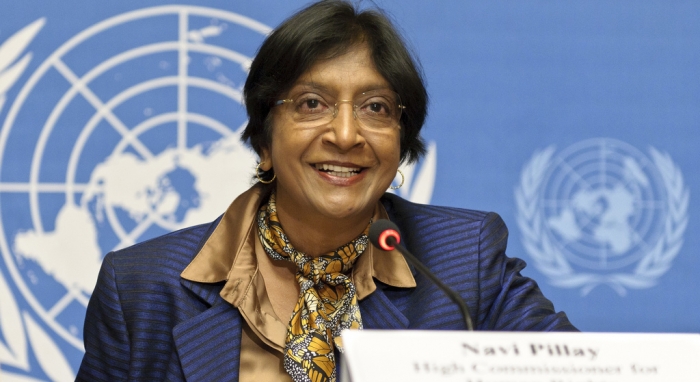By Navi Pillay, former UN High Commissioner for Human Rights and ISHR Board Member
The recent death of Honduran human rights and environmental activist Berta Cáceres is a tragic reminder of the dangers faced by so many of those who dedicate their lives to promoting and protecting the human rights of others.
The situation is particularly grave for defenders of economic social and cultural rights: those who advocate for the right to adequate housing and resist eviction from their lands by major development projects; those who demand the right to water and protest the pollution of their rivers by extractive companies; those who expose collusion or corruption by governments prepared to privilege perceived economic interests over fundamental human rights. Increasingly, these defenders are subject to regressive laws which restrict their legitimate work, such as laws which criminalise protests against business. As the Special Rapporteur on Human Rights Defenders and NGOs such as ISHR, FIDH and Global Witness have documented, defenders of ESC rights are also increasingly subject to surveillance, physical attacks, arbitrary detention, enforced disappearances and even killings.
Women defenders of ESC rights, such as the right to sexual and reproductive healthcare, face heightened risks, including stigmatisation and sexual harassment and attacks.
In the overwhelming majority of cases, there is no adequate investigation, with perpetrators allowed to enjoy impunity and victims denied access to remedy or justice.
These restrictions and attacks on ESC rights defenders amount to restrictions and attacks on ESC rights and sustainable development itself. That is because the work of ESC rights defenders – and their exercise of the rights to freedom of expression, association, assembly and public participation – are essential to the promotion, protection and realisation of ESC rights. Defenders of ESC rights help to develop effective social policy, to enhance service delivery, and to secure access for marginalised and disadvantaged individuals and groups. Their work is essential to promote sustainable development and responsible business. It is vital to combat corruption, to document and expose violations, to pursue accountability, and to secure access to justice for victims.
As a South African, I have seen and experienced first-hand the role of ESC rights defenders in combating poverty and injustice and in promoting universal human rights for all, even the most powerless and disadvantaged. I have seen how the work of those who defend ESC rights benefits entire communities; just as attacks against those who defend ESC rights harm entire communities.
Coming from South Africa and having worked as High Commissioner, I have also seen and experienced first-hand the influence of international law, international mechanisms, and international solidarity in contributing to the promotion and protection of human rights and their defenders at the national level.
That is why it is so important and timely that the UN Human Rights Council is currently negotiating a resolution on the protection of ESC rights defenders. This should be a strong and substantive resolution which recognises the vital work of ESC defenders, condemns attacks and restrictions against them, and contains concrete calls and recommendations to States, business enterprises and other actors to ensure that defenders can work to promote and protect ESC rights, and contribute to sustainable development, without risk or fear.
In its operative provisions, the resolution should call on States to provide a safe and enabling environment and legal framework for defenders’ work. This should include a call on States to review and amend laws that criminalise or unreasonably restrict defenders’ work, ensuring that national laws which govern the work of defenders are themselves compatible with international human rights standards, including the Declaration. The resolution could also condemn the tendency of some States to adopt restrictive national laws that flagrantly breach international standards and then have the audacity to accuse defenders who don’t comply with restrictive provisions, of acting illegally.
With the recognition, protection and exercise of the rights to freedom of expression, association, assembly and public participation being essential factors contributing to the realisation of ESC rights, the resolution should call on States to legislatively entrench these fundamental freedoms. It could also encourage States to ensure that ESC rights themselves are justiciable and enforceable, as is the case in South Africa, and that freedom of information laws provide for a right of access to information pertaining to human rights held by non-State actors such as business enterprises, as is the case in Sierra Leone. With the increasing privatisation of public and social services, together with the fact that business often holds exclusive information (such as to the environmental impacts of major projects), it is imperative to the promotion and protection of ESC rights that ESC rights defenders have access to privately held information.
In addition to promoting general human rights protections, the resolution could also encourage States, in consultation with civil society, to develop and implement specific national laws and mechanisms to protect defenders, such as in Mexico and Cote d’Ivoire, and to investigate and ensure accountability for threats and attacks against them. The killing of brave defenders such as Berta Cáceres should be subject to prompt, thorough and impartial investigations, with impunity being both a cause and a consequence of the dangerous environment within which so many ESC rights defenders operate.
While States have the primary responsibility to ensure a safe and enabling environment for ESC rights defenders, business enterprises also have an important and influential role to play. The resolution could move in this direction by calling on business to engage and consult with ESC rights defenders, to refrain from any interference with their work (even where it targets the business operation itself), and to ensure that they are not complicit in attacks or restrictions through their supply chains or investments. Dutch, Finnish, German and other international investors in the major hydropower project against which Berta Cáceres protested have a role and responsibility to push for accountability for her death and better protection for those brave ESC rights defenders who continue to champion her cause.
Come late-March, Member States of the UN will have the opportunity to co-sponsor a resolution on the protection of ESC rights defenders, to support its adoption by consensus at the UN Human Rights Council, and to take meaningful steps to implement it on the ground. We owe it to the likes of Berta Cáceres and others who risk their livelihoods and lives to promote and protect economic, social and cultural rights to ensure that they do.
Navi Pillay served as UN High Commissioner for Human Rights from 2008 to 2014, prior to which she was a judge of the International Criminal Court and President of the International Criminal Tribunal for Rwanda. Ms Pillay has a distinguished track record as a human rights defender; acting as defence attorney for anti-apartheid activists and political prisoners, helping draft South Africa’s transformative Bill of Rights, and co-founding international women’s rights NGO Equality Now. She now serves as a member of the ISHR Board.




